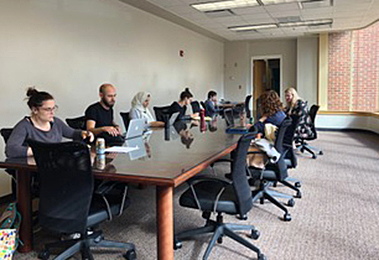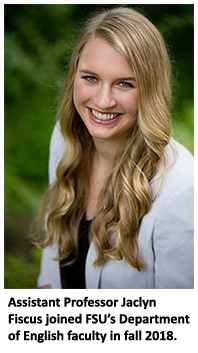Graduate student group creates motivational space for positive writing habits
By Olivia Cameron
A new writing group in the Department of English allows students to work on their projects without getting distracted or losing their inspiration to finish what they’ve started. The Graduate Student Writing Group is a space for graduate students to go to work on any piece of writing within a motivational atmosphere.
 “For as long as I’ve been a grad student—who should be writing at any given moment—my worst enemy has been unstructured time,” says graduate student Travis Maynard, who is a doctoral student in Rhetoric and Composition. “But Dr. [Jaclyn] Fiscus’ writing group has helped to provide some structure to my process; even if I may not feel like writing that day, I know that I owe it to the group to show up and hack away at a blank Word document.”
“For as long as I’ve been a grad student—who should be writing at any given moment—my worst enemy has been unstructured time,” says graduate student Travis Maynard, who is a doctoral student in Rhetoric and Composition. “But Dr. [Jaclyn] Fiscus’ writing group has helped to provide some structure to my process; even if I may not feel like writing that day, I know that I owe it to the group to show up and hack away at a blank Word document.”
English Assistant Professor Jaclyn Fiscus is the writing group supervisor who keeps track of the members and follows up with their attendance to make sure they are maintaining a routine schedule for their writing. The space provides positive peer-pressure for students to push each other to get into a consistent writing mode.
“This type of writing group is something I wish I had as a graduate student,” Fiscus says, as she talked about her past experience at her previous institution, the University of Washington, which only had peer-led writing groups. “Sometimes with faculty support, there is more of a sense of obligation to show up then if it is purely peer-run,” she adds, while discussing how she hopes students use to the writing group create a routine for their own writing habits.
In the fall of 2018, Fiscus began the writing group on Mondays, and then added another on Thursdays  with English Assistant Professor Frances Tran, who teaches literature in the department.
with English Assistant Professor Frances Tran, who teaches literature in the department.
As a new faculty member of Florida State University, Fiscus came to the school in the fall of 2018 to follow her academic interests. She moved to Tallahassee and FSU after receiving her PhD from the University of Washington, in hopes of collaborating with Rhetoric and Composition Professors  Kathleen Yancey and Kristie Fleckenstein.
Kathleen Yancey and Kristie Fleckenstein.
Fiscus came to FSU as a linguist and compositionist, and she works on critical language awareness research. Her focus of study is on beliefs about language and insight on people’s decisions when they produce a text.
When discussing the group with returning members of the reading group, there is a similar theme to the praise behind the  small organization. They admit losing focus when studying or writing alone among different locations on campus, echoing Maynard’s comments that the new writing group is a great way to stay in writing shape.
small organization. They admit losing focus when studying or writing alone among different locations on campus, echoing Maynard’s comments that the new writing group is a great way to stay in writing shape.
“Whatever it is, it works for me and Dr. Fiscus’ writing group offered me the opportunity to get some dedicated, focused writing time in an environment that worked well for me,” says Ellen Cecil-Lemkin, Rhetoric and Composition doctoral candidate and Reading-Writing Center coordinator. “Last semester, I primarily worked on revising an article for publication and I was able to complete all of my revisions by the end of the semester. Dr. Fiscus even gave me some feedback on my revisions, which was extremely helpful.”
Fiscus says she is interested in supporting the three major concentrations of the English department—rhetoric and composition, creative writing, and literature, media, and culture—and how the department collaborates as a whole. Even though she focuses on linguistics and composition, she also teaches classes on the editing, writing, and media track and composition theory. As a member of the department’s Placement Committee, she strives to get to know all of the students in the department.
Netty Lehn is a fifth-year Ph.D. student in Rhetoric and Composition and she believes wholeheartedly in the group.
“I use my time in writing workshop to work on my dissertation and on proposals, drafts and revisions of scholarly articles,” says Lehn, whose research interests are in critical pedagogy and writing program administration. “I also had a proposal accepted for an article, and I had worked on that proposal in writing group, so I’m proof that the group works.”
The noncredit writing group typically meets Mondays from 3:30-5:00 p.m and Thursdays from 2:30-4:00 p.m. in the Williams Building’s 4th-floor Skybox, and the meeting is open to any English graduate students interested in time management of their own work. For more information, Professor Fiscus can be reached at jfiscus@fsu.edu.
Olivia Cameron is a senior who is majoring in English, with a concentration in editing, writing, and media.

